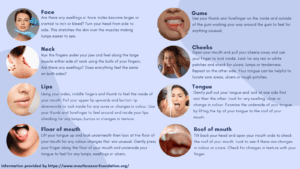Oral cancer is where a tumour develops on the surface of the tongue, mouth, lips or gums. Last year 8,864 people in the UK were diagnosed with this form of cancer. According to Mouth Cancer Foundation, the ten-year survival rate is between 18% and 57% depending on where the cancer develops and how early it is found.[1]
According to the NHS, mouth cancer is the 6th most common cancer in the world, but it is less common in the UK. More than 2 in 3 cases develop in adults over the age of 55 and only 1 in 9 happen in people younger than 55.[2]
Types of Mouth Cancer
Squamous cell carcinoma is the most common form of mouth cancer accounting for 9 out of 10 cases.
Less common types of mouth cancer –
- Adenocarcinoma, which is cancers that develop inside the salivary glands
- Sarcoma, which grows from abnormalities in bone, cartilage, muscle or other tissue
- Oral malignant melanoma, where cancer starts in the cells that produce skin pigment or colour (melanocytes). There appear as very dark, mottled swellings that often bleed.
- Lymphoma, which grows from cells usually found in lymph glands, but they can also grow in the mouth.
Identifying mouth cancer is crucial in aiding an early diagnosis, some symptoms of mouth cancer include –
- Mouth ulcers that are painful and do not heal within several weeks
- Unexplained, persistent lumps in the mouth or neck that do not go away
- Unexplained loose teeth or sockets that do not heal after extractions
- Unexplained, persistent numbness or an odd feeling on the lip or tongue
- Sometimes, white or red patches on the lining of the mouth or tongue. These can be early signs of cancer, so they should be checked.
- Changes in speech, such as a lisp[3]
A recent survey we conducted revealed that 50% of adults don’t know any signs or symptoms of mouth cancer. You have a much better chance of beating this type of cancer if you spot it early. Sadly, far too many cases of mouth cancer are not found early enough so it is important you know how to do self-checks.[4]
Self examination guide

Dentists can also spot early signs of oral cancer so it is vital to attend all regular dental check-ups.
[1] https://www.mouthcancerfoundation.org/mouth-cancer-facts-and-figures/
[2] https://www.nhs.uk/conditions/mouth-cancer/

